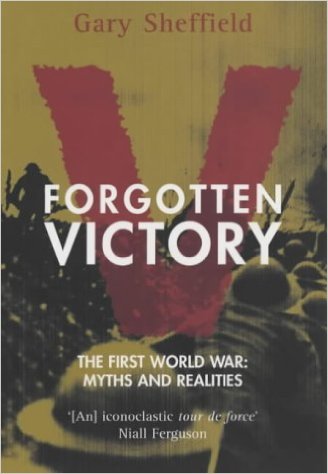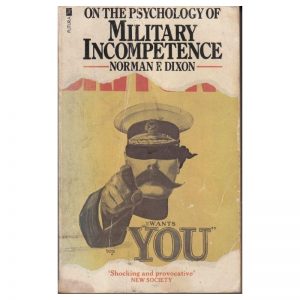
Gary Sheffield’s Forgotten Victory still remains mandatory reading for those seeking to understand the First World War and Britain’s role in that conflict.
 Forgotten Victory is a revisionist view of the Great War that challenges deeply held views on Britain’s reasons for fighting and its subsequent military performance on the Western Front in that conflict. It directly confronts the ‘butchers and bunglers’ school of history that has been put forward by historians like Denis Winter, Alan Clark, Norman Dixon and John Laffin.[1] They argued the Great War was futile slaughter conducted by myopic and incompetent generals, especially British Expeditionary Force (BEF) Commander Sir Douglas Haig, who pointlessly let men ‘die as cattle’ in unnecessary battles.
Forgotten Victory is a revisionist view of the Great War that challenges deeply held views on Britain’s reasons for fighting and its subsequent military performance on the Western Front in that conflict. It directly confronts the ‘butchers and bunglers’ school of history that has been put forward by historians like Denis Winter, Alan Clark, Norman Dixon and John Laffin.[1] They argued the Great War was futile slaughter conducted by myopic and incompetent generals, especially British Expeditionary Force (BEF) Commander Sir Douglas Haig, who pointlessly let men ‘die as cattle’ in unnecessary battles.
These views are still prevalent among historians, as well as the public. For example, Professor Frank McLynn FRHistS FRGS, reviewing Forgotten Victory on its 2001 publication, wrote in The Independent, that the book was ‘an insult to the memory of those who died on the Western Front’. McLynn also believed that it was a disgrace that Sheffield should seek to ‘launder’ the reputation of ‘butcher’ Haig.[2]
Forgotten Victory puts forward a different view of Britain’s role in the First World War. It has three broad points. Firstly, the war was a tragic but necessary conflict to challenge rising German militarism and aggression. Secondly, British generals made costly errors in early battles but learnt from their mistakes (the so-called “learning curve”). Finally, that by 1918, the British citizen army was the world’s most effective fighting force that ensured that the allies won.
Sheffield sets out a convincing case with a strong methodology based on historical facts rather than folklore or Blackadder (great comedy but poor history). He shatters the ‘lions led by donkeys’ myth by placing Haig and his colleagues, and their decision-making, in the Edwardian historical context in which they lived and worked. He accepts the generals made mistakes but shows how they adopted new technology and tactics to cope with the static stalemate of industrialised trench warfare. Lastly, he shows how these changes contributed to the fighting effectiveness of the BEF that much helped make final victory.
This review originally appeared on Amazon in a different format.
[1] D. Winter, Haig’s Command – A Reassessment (Viking, 1991), A. Clark, The Donkeys: A History of the British Expeditionary Force in 1915 (New York, 1961), N.F. Dixon, On the psychology of military incompetence (New York,1976), J. Laffin, British, Butchers, and Bunglers of World War One (Godalming 1998).
[2] The Independent, 29 June 2001.

